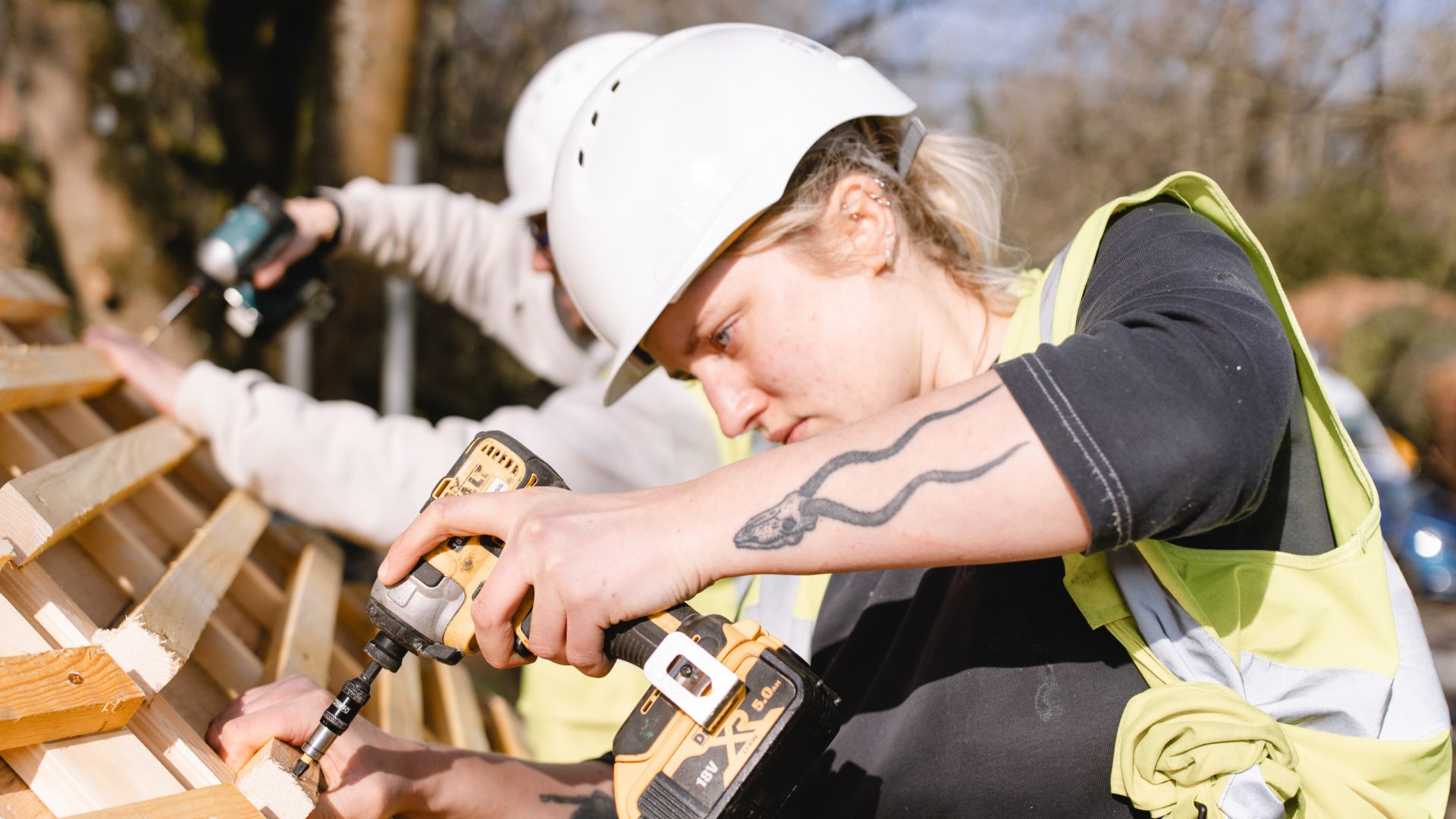The Building Craft and Conservation Programme supports those working in the construction and craft sector to push their skills to the next level and continue on their journey to becoming the next generation of master craftspeople.
The King’s Foundation believe that it is crucial to preserve the wisdom and knowledge that embodies many of the traditional building skills which have shaped our historical built environment. As many workers in the sector now reach retirement age it is vital that these skills are passed on to the next generation of master craftspeople, ensuring that we can continue to restore and conserve our history, and also demonstrate the significant role that traditional craft skills can play in creating new spaces and places.
The Building Craft and Conservation Programme is geared towards those with experience and interest in areas such as: stonemasonry, dry stone walling, carpentry and joinery, bricklaying, blacksmithing, plastering, thatching, roofing, tiling/ceramics, glasswork, painting and decorating. (List not exhaustive.)
Course structure
The Building Craft Programme is a full time, nine-month course which gives practical experience in traditional building skills and the opportunity to work towards a Level 3 NVQ in Heritage Skills.
The King’s Foundation Summer School
At the start of the programme students participate in a three week long Summer School delivered on the Dumfries House estate in Scotland. This is an opportunity to introduce students to the wider teachings of The King’s Foundation, showcasing our thinking and ethos with regards to the built environment.
Week one of the Summer School encourages observation of our environment through life drawing, stone carving and geometry, with additional talks on placemaking, conservation and authenticity.
The second week is a series of interdisciplinary workshops including stonemasonry, earth building and thatching, glasswork, timber framing, plastering and blacksmithing.
In the final week students collaborate to learn the craft of tile vaulting.
Industry Work Placements
This invaluable experience will involve participation in up to 14 weeks of placements with crafts people, heritage conservation and traditional construction companies around the UK. Placement are tailored towards a students trade or craft area and provide an opportunity to build practical skills and gather vital evidence towards the Level 3 NVQ.
Students typically take part in two or three placements with different organisations, of 4-6 weeks duration.
Business Skills and NVQ study
These study days will introduce you to many of the core skills required when setting up and running a business in the construction sector. Time is also spent as a cohort working towards your NVQ assessment paperwork and on study trips to places of interest.
Live Project
The Live Project is an opportunity to work alongside fellow participants to gain first-hand experience of completing a project on site. Students will work alongside a project manager, surveyor and architect and are expected to problem solve and support each other along the way to fulfilling the project brief to professional standards.
Start date
July 2026
End date
March 2027
Location
The Dumfries House Estate in East Ayrshire, Scotland and Highgrove Gardens in Gloucestershire, with industry placements taking place across the UK.
Entry requirements
The Building Craft Programme is geared towards those with experience in craft areas such as: stonemasonry, carpentry and joinery, bricklaying, blacksmithing, plastering, thatching, roofing and tiling, painting and decorating. (List not exhaustive.)
Applicants should have an interest in developing their craft with a focus towards heritage, conservation and traditional methods whilst striking a balance with 21st century ways of working. The Building Craft Programme aims to highlight the holistic nature of our built environment and as such promotes multidisciplinary learning, providing exposure to elements of architecture, design and a range of craft skills.
The Building Craft Programme is not an entry level programme and to be successful in gaining a place on the course, candidates must have prior experience in their craft area of choice, either via college or onsite working experience. Applicants must be able to demonstrate at least one of the following:
• NVQ/SVQ Level 2 or 3 or equivalent in a building craft/construction subject.
• Qualification in a building craft/construction subject from a recognised authority.
• Significant working experience in their chosen craft/trade area.
Please note, you will required to submit a digital portfolio containing examples of work/projects you have undertaken in relation to your craft/trade area.
International students
The King’s Foundation is proud to offer educational opportunities to students from all around the world. Should you require a visa to study or work in the UK, it is important to note that whilst The King’s Foundation is a licensed student sponsor, this sponsorship does not extend to those undertaking the Building Craft Programme. Therefore, acceptance onto the Building Craft Programme alone is not sufficient to obtain the appropriate visa.
In most cases you will be required to hold one of the following in order to be eligible for the Building Craft Programme:
• UK Passport Holder
• Settled Status / Indefinite Leave to Remain in the UK
• Pre-settled Status (eligible for the duration of the course).
If you require a visa to work or study in the UK, please contact the programme manager prior to applying.
Costs and funding
All participants of the Building Crafts Programme will be awarded a full scholarship which covers the NVQ and course fees. Students receive a monthly tax-free bursary of £1,500 (pro-rated) as a contribution towards basic travel and living costs. Students are advised to have additional funds to cover other expenses they will incur.
Participants will be required to arrange and pay for their own accommodation, travel, subsistence and any associated living costs while on the course. The majority of materials needed for the taught elements of the course will be provided.
How to apply
Each year the programme hosts up to a maximum of twelve participants. Participants are selected via a process of application, shortlisting, and interview.
Applications for the 2026-27 programme are now closed.



